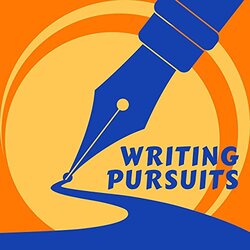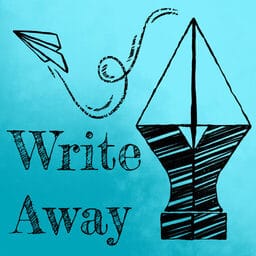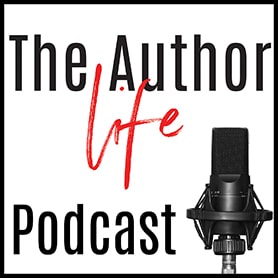A curated collection of the latest and most interesting podcast episodes about the author life.
I haven’t worked three jobs since Covid started. This month has been crazy as I transition from one job to the next. Between articles for the newspaper, training at a job, and putting together all the paperwork for my replacement, my own writing has taken a back seat. So, I’ve been listening to a few podcasts that helped me get ready to be back on track and tackle the mountain of words I know I can write. From planning to avoiding lies and fears, enjoy.
Top 3 Must-Listen Episodes
Writing Pursuits// EP 31: Eight Ways to Create Margin in Your Author Life

Kathrese McKee had a family emergency that flipped her writing work on its head because she created a schedule that left no room for error. In this episode, she goes over the meaning of margin and eight steps on how to fit it into your own life.
According to Kathrese, the idea of margin is about having a system in place that will allow the work to continue when the world turns sideways on you.
Step One: Do less. A simple one but with our mindset of go, go, go it can be hard to remember that not everything has to be done in one day.
Step Two: Coordinate errands of everyday activities. This is a great way to see what you can get done together and see how to better use your time.
Step Three: Store provisions for the winter. This means that if you can stock up on something like podcast episodes or social media posts, it can be there in case you don’t have time to create one. You have something to fall back on. Batching can be your friend.
Step Four: Streamline and systemize. If you find that you are doing something over and over again, there’s no sense in redoing it every time. Look at what you are doing, make a note of what is always the same and build it again. Look for ways to make it better and easier each time.
Step Five: Train others to do the work and delegate tasks. When you are able to, give the tasks you don’t like or dread to others, it frees up your time.
Step Six: Get adequate rest. Rest is vital to your brain for writing.
Step Seven: Prepare for tomorrow’s morning routine, tonight. getting yourself set up for the morning will help you slide easily into it.
Step Eight: Don’t overbook or schedule your time. Add buffers between activities to give you more breathing space and less of a rushed mood.
Write Away Podcast // EP 92: How do you create believable relationships between characters?

In this episode, Crys and JP continue through the major arcana of tarot cards with questions related to writing.
VIII Strength Upright: strength, courage, influence, passion.
VIII Strength Reversed: inner strength, doubt, low energy, raw emotion.
JP describes the image of the card as a woman gently stroking a lion’s head. It shows that she has tamed the beast with her calmness and love.
The question presented with the card: How do you use fear to drive the story?
According to Crys, she likes to pull on her love of the lie the character believes. She knows that the lie is usually one of the biggest fears of the characters and can motivate them to keep going toward the positive. All stories have a fear of some kind, and she likes to try to find them in any genre.
JP prefers to lean into the story hypothesis. He likes to lean into the weakest point and dark moment to see what is keeping his characters from moving in the positive direction and the fear that builds at that moment. Fear is a way to teach and survive and brings us to the root of storytelling.
Grammar Girl // Why “‘Em” Isn’t Short for “Them.” The Subjunctive. Sussies.

In this episode, we learn the amazing history of a word that we commonly use and sometimes get yelled at by parents to talk properly. This word is ’em.
What’s fascinating about this little word is the history behind it. The word comes from Old English with roots in the Norse language.
‘EM doesn’t come from dropping the TH from the word THEM.
‘EM is a pronoun HEM a plural pronoun.
After some time both Hem and Them was used for a time in the Middle Ages. They and Them was used almost a subject pronoun while Hem was used for grammatical objects. Over time the words started to blend together, and the word Hem became a colloquial word and could be used to pinpoint someone’s dialect. With the history of the English language showing stark evidence of dropping the H sound of words, it goes to show how the simple word has changed and been interoperated over the years. This wonderful history of the word is summarized from the work of Valerie Fridland.
Within the same episode, written by Edwin Battistella, we learn about use of subjunctives. Subjunctives are used to show the mood the writer wants the reader to understand.
In Neil Gaiman’s “American Gods”, the sentence ‘He wondered if he were hallucinating,’ is the example used in this piece.
The Subjunctive with the word were, sets up a situation that isn’t real or wishful thinking. While it might sound strange to read, it does allow the mind to know that the sentence written is something the character is also questioning. It can add a bit of drama, flare, and uncertainty to the story when used correctly.
The Latest from The Author Life Podcast
62: HOW HAS BECOMING THE DIALOGUE DOCTOR CHANGED HOW YOU ENJOY MEDIA?

This week author Crys Cain is joined by special guest Jeff Elkins, The Dialogue Doctor. They discuss how digging deeper into dialogue has changed how they enjoy books and movies.
The Wildcard: Interesting Episode from a Non-Writing Related Show
Writing with Jenna Moreci // 10 Worst Lies Told by the Writing Community

Jenna Moreci is at it again. She has searched for the falsehoods that are sped rapidly through the writing community and are told so often that writers believe them. Her research has found 10 lies that are common enough to be set straight.
- All it takes is a good book to be a success.
This is not the idea that you should be going for. Marketing is the way to get your book out there. No one is going to find the book if you are not willing to market. Understand that your book is a product, and you will need to sell it. - Anyone can write a good book.
A writer needs be a good storyteller and a good writer to make good books. This takes work to hone your craft. The experts in the field didn’t start out writing perfect novels in sitting. They worked and practiced and learned the craft through education and/or trial and error. - You have to have a writing coach.
People crave mentorship, but there are a few things to be cautious of when looking into this. Make sure the person you are getting coaching from is creditable and aren’t promising you guaranties. - Indie Books can’t get into bookstores.
Getting into bookstores depends mostly on reach, pricing and demand. Depending on how you publish your books also makes it easier for bookstores to pick up your book. Pricing will determine the cut you get, and the seller gets. If you do your marketing right and your book is in high demand, the bookstores will start to stock the books. - You must be producing and publishing five or more books a year to be successful.
Once again marketing plays a big role in the amount of people seeing your books. If you are publishing smaller amounts of books, then marketing will be your key. If your readers are getting used to rapid release and you change it up on them, your sales could drop and so could your readership. - You have to write every day.
This has been disproven many times, but it’s still something that is passed around the circle. Doing what is right for you is the best. Pushing yourself to write on days or times you wouldn’t is bad for your writing. Don’t stress yourself into thinking you must make time on a day when you really can’t do it. - If you can’t pants a novel, you don’t have the natural talent to be a writer.
If not planning is your thing that’s cool. If you need to have things plotted out to make writing comfortable to you, then there is nothing wrong with that. Natural talent has nothing to do with the preferred writing process. - No tears in the reader means no tears in the writer.
Some people feel and imagine their characters as real people and can empathizes with them. Others are writing fiction and don’t need to empathize with the character. This can be the same with readers. - Self Publishing is easier than Traditional Publishing.
Because there is no rejection process, authors think this is the easier way to go. It’s a quicker way to be published, but all of the work is on the author. Finding a good editor, cover artist, marketing, and accounting is all on you. It is a business decision not an easy way out. - You have to publish traditionally to be successful.
Look at the world around you. There are many indie publishers that are successful. To be traditionally published doesn’t mean you are better or it’s the only way to get your book in front of people. Do research and find out what is the right thing for you to do with your book.
Inside The Author Life
What to do first?

Get the APB delivered straight to your inbox!
Need some help with your story?
Three Story Method certified editors are standing by, ready to help you become a better writer. Click on our picture or visit https://theauthorlife.com/editing/ for more details!
Posted in Author Podcast Broadcast


